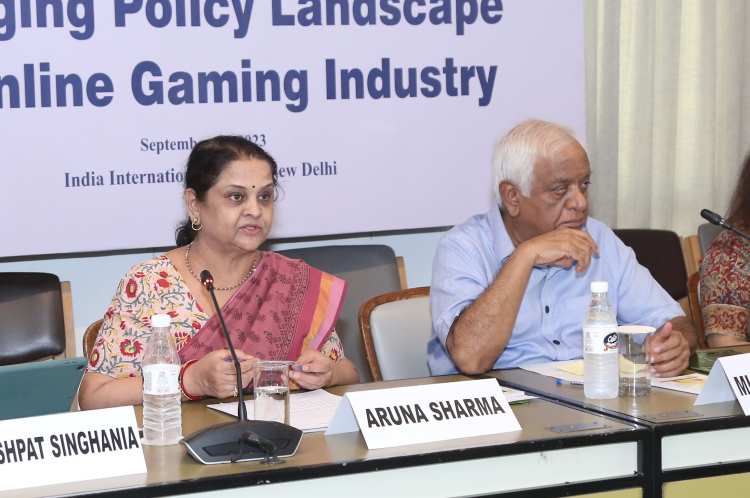
India’s online gaming industry has been experiencing a transformative journey in recent years, marked not only by its impressive growth but also by the regulatory challenges and debates that have emerged around its taxation and societal impact. While the imposition of an exorbitant 28% Goods and Services Tax (GST) rate on online gaming has raised questions and comparisons to sin industries such as alcohol and gambling, it is crucial to analyse the issue in length and the multifaceted dimensions of this rapidly evolving sector, speakers at a roundtable discussion, Changing Policy Landscape for Online Gaming Industry in India, organised by Policy Circle.
First and foremost, it is essential to grasp the remarkable evolution of online gaming. It has transcended its status as a mere leisure activity and now serves as a powerful tool for problem-solving, skill development, and education. Gamification techniques have proven their worth in numerous areas, from enhancing financial literacy to promoting cognitive skills. Rather than pigeonholing online gaming as a ‘sin’ industry, we must embrace its potential to drive positive societal change, said Srinath Sridharan, corporate thinker and author.
READ I EU green bond standards: Pioneering a global shift towards sustainability
Self-regulation by online gaming industry
One of the foremost concerns among policymakers centres on the possibility of online gaming inadvertently fostering irresponsible behaviour or leading to unintended social consequences. To address this legitimate concern, fostering responsible gaming practices is paramount.
Encouraging players to make informed choices, providing robust addiction management resources, and ensuring the industry actively contributes to public safety campaigns are vital steps toward responsible gaming. By adopting self-regulation and forging partnerships for public safety initiatives, the industry can demonstrate its unwavering commitment to responsible gaming, alleviating concerns policymakers may hold, said Aruna Sharma, former secretary, ministry of electronics and IT.
Other speakers at the event were Justice Mukul Mudgal, Former Chief Justice, Punjab and Haryana High Court; Roland Landers, CEO, All India Gaming Federation; Shivani Jha, Director, eSports Players Welfare Association; Vidushpat Singhania, Managing Partner, Krida Legal; Sameer Chugh, Member, Executive Council, E-Gaming Federation; Abhishek Issar, founding member, FEAI; and Shahana Chatterji, Partner, Shardul Amarchand Mangaldas.
While examining the historical evolution of taxation in the gaming industry, we unearth a critical shift, one driven not by moral judgments but by revenue considerations. The transition from exempting gaming income to taxing it aimed to ensure that individuals with substantial winnings contributed taxes commensurate with their ability to pay.
While significant progress has been made with the introduction of Rule 133 of the Income Tax Rules, offering clarity in computing net winnings for online gaming, it is evident that further refinements are needed, especially in distinguishing between professional and casual gaming. Achieving this level of granularity would pave the way for a taxation system that is both fair and balanced.
Shifting the focus to the complexities of GST, the heart of the debate lies in whether only the platform fee or the entire stake amount should be taxable. While the government’s decision to impose a 28% GST rate on the entire stake amount has ignited vigorous debates, it is essential to understand the broader implications.
High tax rates have the potential to stifle the growth of the online gaming industry, posing risks of job losses and hindering India’s burgeoning tech export potential. Moreover, concerns have arisen about the potential to discourage foreign investors by creating uncertainty in tax policies. Striking the right balance between tax revenue and economic growth is a paramount consideration.
As the online gaming industry navigates this intricate taxation landscape, there is a clear call for more nuanced approaches that distinguish between professional and casual gaming. Such an approach would not only contribute to the development of a fair and balanced taxation system but also encourage growth, innovation, and transparency within the industry.
India’s online gaming industry is at a pivotal juncture, poised for both challenges and opportunities. Balancing taxation, policy formulation, and economic growth is essential to nurturing this burgeoning sector while ensuring a fair contribution to tax revenue. India must embrace a progressive tax regime that not only fosters responsible gaming but also recognizes the industry’s positive contributions to society. By doing so, we can pave the way for a more prosperous future in the online gaming sector, fostering innovation, growth, and transparency while safeguarding the interests of all stakeholders.
Anil Nair is Founder and Editor, Policy Circle.

